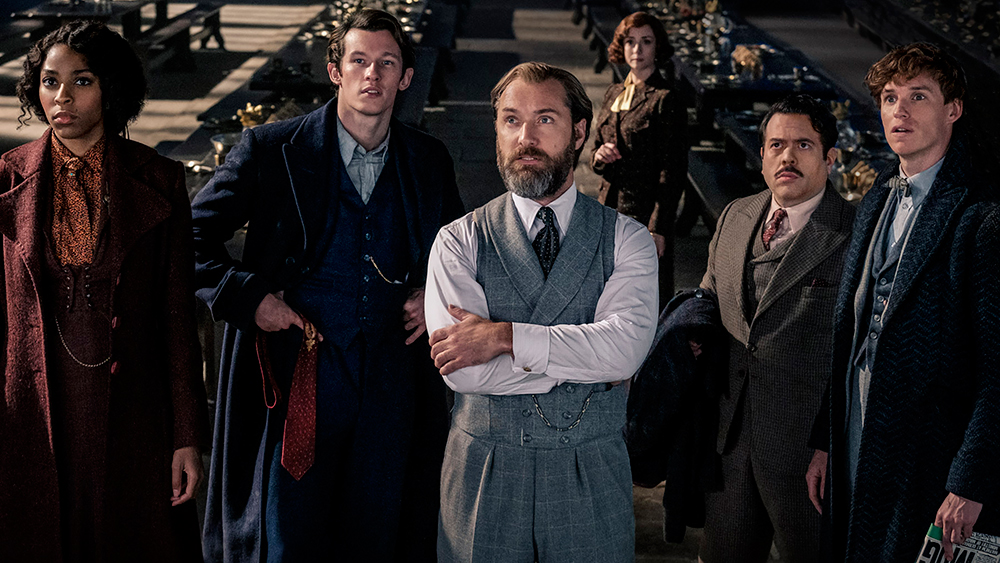A day prior to the glitzy world premiere of “Fantastic Beasts: The Secrets of Dumbledore,” Ezra Miller, who has a key role in the upcoming “Harry Potter” spinoff sequel, was arrested for disorderly conduct and harassment.
In another timeline, Miller, known for striking red carpet outfits and zany interviews, would have been front and center to promote “The Secrets of Dumbledore,” which opens in North American theaters on April 15. Instead, that incident and other eyebrow-raising events forced Warner Bros. to downplay Miller’s involvement in the film franchise. Complicating matters is the fact that Miller also headlines next year’s DC Comics adaptation “The Flash” for Warners.
It’s the latest in a long list of controversies plaguing “Fantastic Beasts.” The fantastical series was intended to wring newfound riches from author J.K Rowling’s sprawling Wizarding World after 2011’s “Harry Potter and the Deathly Hallows – Part 2” capped off a decade of generation-defining blockbusters that turned Daniel Radcliffe, Rupert Grint and Emma Watson into household names. But through a combination of bad luck, casting choices gone wrong, creative shortfalls and diminishing box office returns, the prequel story — which is set decades prior to the adventures of Harry, Ron and Hermione — has become a headache for Warner Bros. Rather than expanding the franchise’s relevance beyond Potter and his pals, “Fantastic Beasts” hasn’t managed to justify its existence without everyone’s favorite boy wizard.
“This is their ‘Star Wars’ franchise. You expect more,” says Exhibitor Relations analyst Jeff Bock, in reference to Disney’s premier franchise set in a galaxy far, far away. “This is supposed to be a crown jewel, and it’s not behaving like one.”
Warner Bros. declined to comment.
For Warner Bros., “Harry Potter” is one of the two flagship franchises (DC Comics is the other) intended to prop up the studio’s film strategy in an era where streaming services have fashioned themselves as major rivals to traditional players. But what happens when your Tiffany brand starts to rust?
Miller’s arrest, which took place nearly two years after footage surfaced of the actor appearing to choke a woman outside a bar in Iceland, adds to the troubles that have mounted since the third “Fantastic Beasts” was greenlit. Given lackluster reception for 2018’s sequel “The Crimes of Grindelwald,” Warner Bros. initially postponed filming in 2019 to retool the third movie rather than churn out follow-ups on an assembly line. COVID-19 added more delays. In that time, Johnny Depp, who portrayed the dark wizard Gellert Grindelwald in the first two installments, was forced to exit the movies after losing a libel case against the British tabloid The Sun, which published an article calling the actor a “wife beater.” (He was replaced by Danish actor Mads Mikkelsen.)
During the same period, “Harry Potter” creator J.K. Rowling went from beloved author to deeply polarizing figure due to her controversial views on sex and gender identity. And last week, WarnerMedia chairman Ann Sarnoff, who was responsible for overseeing the larger Harry Potter universe, was ushered out of the company ahead of its merger with Discovery. (Kevin Tsujihara was initially at the helm of everything Potter before he was ousted as chairman in 2019.) Toby Emmerich, Warner Bros. Pictures Group chairman, and Courtenay Valenti, president of production and development, manage the film franchise, so the spellbound property isn’t entirely in limbo.
In case those entanglements weren’t taxing enough, audiences don’t really seem to like the series. After frequent complaints from moviegoers about tangled plotting, an overabundance of characters and not enough meaningful connection to the deeply admired books, Warner Bros. took painstaking steps to retool the story and recapture the charm of the original saga. That meant hiring screenwriter Steve Kloves, who penned seven “Harry Potter” movies, to co-write “Fantastic Beasts 3” with Rowling. It also involved relegating once-prominent characters, like Katherine Waterson’s Tina Goldstein, to the fringes in favor of elevating the screen time of Jude Law’s Dumbledore and Mikkelsen’s Grindelwald. But it hasn’t entirely helped. Variety’s chief film critic Peter Debruge called the latest entry a “vastly improved sequel,” but for the most part, “The Secrets of Dumbledore” hasn’t been particularly well received.
“There have been franchises that have been hit with problems, but not like this,” said Stephen Galloway, the dean of the Chapman University film school. “This is a confluence of events that does not bode well.”
At the box office, “Fantastic Beasts and Where to Find Them” was commercially successful, grossing more than $800 million globally. But the follow-up, “The Crimes of Grindelwald,” was dinged by negative reviews and stalled out with $650 million worldwide, a nearly 20% decline from the first film. It’s the lowest-grossing Potter film to date. The upcoming “Secrets of Dumbledore” faces an especially fraught moviegoing landscape. Since COVID-19 upended the theatrical business, only five Hollywood movies have generated at least $500 million at the worldwide box office. That means that beloved or not, “Fantastic Beasts 3” will struggle to come close to its predecessors in terms of box office returns.
Internationally, where the series is especially popular, the third “Fantastic Beasts” faces other challenges. Dumbledore is openly gay in the newest movie, which could damage the box office in some places. China, Saudi Arabia and the United Arab Emirates have strict censorship mandates regarding sexuality, swearing, and other aspects that don’t comply with those nation’s cultural views. “The Secrets of Dumbledore” won’t play in Russia, another country known to remove movie scenes involving homosexuality, due to its invasion of Ukraine.
Those drawbacks could be cause for concern, because the first two “Fantastic Beasts” installments made nearly 75% of revenues from foreign sales. And the tentpoles have not gotten less expensive to produce even as the global box office for Hollywood films has contracted. After shelling out $200 million for each of the first two films, Warner Bros. made a concerted effort to rein in the budget for “Secrets of Dumbledore,” working to keep the price tag in the high $100 million range. But pricey COVID-19 protocols wound up erasing those efforts. The third film still carries a $200 million budget, not including expensive marketing costs.
Declining box office ticket sales suggest that “Fantastic Beasts” hasn’t charmed the fans or converted young kids into aspiring witches and wizards. That has reverberating effects on the larger Wizarding World, which has become much more than a film franchise. There are theme parks at Universal Studios in Orlando, Hollywood and Japan, as well as live events, studio tour stops, a successful Broadway play in “Harry Potter and the Cursed Child,” and endless consumer products that could fill the vaults at Gringotts… and then some. Think hundreds of millions in profits.
“Feature film revenue is the tip of the iceberg here,” Galloway says. “It’s pretty crucial to their business moving forward.”

J. K. Rowling attended the world premiere of “Fantastic Beasts: The Secrets of Dumbledore,” but she didn’t take photos with the cast.
Joel C Ryan/Invision/AP
Warner Bros. has clearly bet big on Rowling, allowing her to stretch the flimsy source material for “Fantastic Beasts” into five films. But Rowling’s repeated comments against transgender women have put the studio in a precarious situation: Condemn the literary doyenne and jeopardize a billion-dollar relationship; defend her and risk alienating fans who were already on the fence. Internally at Warners, there’s a growing sense the prequel series is no longer worth the time and treasure given the embarrassment of needing to replace Depp, the landmines of Rowling and Miller, and the high costs associated with all things Hogwarts.
Rowling is active on Twitter but mostly avoids press these days because she believes her comments have been repeatedly taken out of context by the media, according to knowledgeable individuals. After sitting out HBO Max’s “Harry Potter” 20th anniversary special, Rowling made a rare appearance at the London premiere of “Fantastic Beasts 3.” However, she stopped short of talking to journalists and did not take red carpet photos with the cast. Those actions, as well as her near-silence on social media regarding the release of “The Secrets of Dumbledore,” come as a stark contrast to her involvement in promoting the first two “Fantastic Beasts” films.
As for Law, Eddie Redmayne, who plays magizoologist Newt Scamander, and the other faces of the prequel franchise, they’ve grown increasingly press shy over fears of getting caught in the crosshairs. Reporters will inevitably ask about Rowling’s contentious beliefs, and though the stars may disagree, they don’t want to offend Rowling, a source says. Contractually, actors must engage in “good faith publicity efforts,” but there’s not much the studio can do to force their hands. Much of the movie’s publicity was limited to an Imax fan event in New York City and a three-day international press junket in London, in which reporters are granted roughly five to 10 minutes to speak to actors — hardly enough time to get to probing questions. And, let’s be honest, junkets aren’t really known for producing many Mike Wallace moments.
As for what’s next? There’s speculation about whether or not “Fantastic Beasts” will complete its ambitions as a five-film franchise. At the moment, there’s no screenplay for a fourth installment, sources have confirmed. Executives at Warner Bros. are waiting to see how “The Secrets of Dumbledore” is received before giving films four and five the greenlight.
Analysts believe Warner Bros. could save face by returning to reliable favorites at Hogwarts School of Witchcraft and Wizardry. For one, “Harry Potter and the Sorcerer’s Stone” director Chris Columbus expressed an interest in adapting the “Cursed Child” stage show — which picks up directly after the epilogue in “Deathly Hallows” and centers on Harry, Ron, Hermione and their offspring — for the big screen. (Though Warner Bros. is an investor in the Tony-winning play, Rowling owns the rights to “Cursed Child.”) Potter and company could also find new life on streaming; though nothing official is in the works, there are early conversations about a “Harry Potter”-related TV series for HBO Max. A friendly piece of advice? Bathilda Bagshot’s handbook “A History of Magic” may not be the most commercially viable Potter text to turn to next.
“The only way to put ‘Harry Potter’ back on the map is to go back to the original characters,” Exhibitor Relation’s Bock says. “That’s where the money is at the box office.”
From Variety US



































